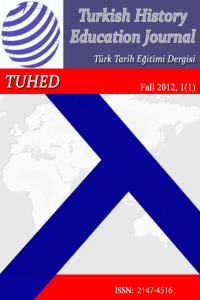İlköğretim 6. Sınıf Sosyal Bilgiler Dersi “Yeryüzünde Yaşam” Ünitesinde Yer Alan Tarih Kavramlarının Öğretiminde Karşılaşılan Kavram Yanılgıları Üzerine Bir Eylem Araştırması
Abstract
Özet: Kavramlar, düşünmenin ve öğrenmenin gerçekleştiği yer olan bilişin temel yapı taşlarını oluşturdukları için etkili ve anlamlı bir öğrenmenin gerçekleşmesinde önemli bir role sahiptirler. Ülkemizde yapılandırmacı yaklaşıma dayalı olarak 2004 yılında oluşturulan ilköğretim sosyal bilgiler öğretim programında kavram öğretim ve öğrenimine önemli bir yer verilmiştir. Öğretim programında kavramların giriş, gelişme ve pekiştirme seviyelerinin hangi sınıf düzeyinde verileceği özel olarak belirtilmiştir. Sosyal bilgiler dersinde kavram öğretim ve öğreniminde karşılaşılan en önemli sorunlardan birisi kavram yanılgılarıdır. İlköğretim sosyal bilgiler dersi tarih konularının öğretiminde önemli bir engel olarak karşımıza çıkan tarih kavram yanılgıları üzerine yapılmış yeterli çalışma bulunmamaktadır. Literatürdeki bu eksikliği gidermeyi hedefleyen bu çalışmada, sosyal bilgiler eğitimi çerçevesinde tarih konularının öğretiminde karşılaşılan kavram yanılgılarının tespit edilmesi, ortadan kaldırılması ve azaltılması hedeflenmiştir. Çalışmada nitel araştırma desenlerinden eylem araştırması kullanılmıştır. 6. Sınıf sosyal bilgiler dersi “Yeryüzünde Yaşam” Ünitesinde geçen ‘milat’, ‘yüzyıl’, ‘çağ’, ‘kronoloji’, ‘fetih’ ve ‘uygarlık’ kavramlarına ilişkin öğrencilerin yanılgılarını tespit etmek ve gidermek amacıyla kavram haritaları, kavram çarkı diyagramı, çalışma yaprağı, tarih şeridi, görüşme ve öğrenci günlükleri gibi çeşitli uygulamalar yapılmıştır. Verilerin çözümlenmesinde betimsel analiz yöntemi kullanılmıştır. Çalışma sonucunda öğrencilerin araştırılan kavramlara ilişkin birçok yanılgıya sahip oldukları, günümüz bakış açısıyla geçmişe baktıkları ve anakronizim sorunu yaşadıkları belirlenmiştir. Bu yanılgıları ortadan kaldırmak amacıyla kullanılan yöntem, teknik ve etkinliklerin oldukça başarılı olduğu, öğrencilerin kavram yanılgılarında önemli bir azalma olduğu tespit edilmiştir.
Anahtar Kelimeler: Kavram Yanılgısı, Anakronizm, Sosyal Bilgiler, Tarih Eğitimi, Eylem Araştırması
Abstract: Concepts play an important role in effective and meaningful learning in that they are the building blocks of one’s cognitive structure where thinking and learning take place. For this reason, the elementary social studies education program that was restructured on the basis of the constructivist approach as of 2004 emphasizes the importance of the teaching and learning of concepts. In that program, concepts are specifically categorized as basic, intermediate and advance in terms of their complexity for each grade level. Student misconceptions are one of the most commonly confronted problems in teaching the social studies concepts. There are a large number of studies on different aspects of student misconceptions in mathematics and science education. But, that is not the case for social studies education. The literature on student misconceptions about historical topics in social studies courses is quite barren and thus in need of growing. This study aimed to address this gap in the literature by examining students’ misconceptions about historical topics in social studies at the sixth grade level. Action research was used as a method in the study. Concept map, concept diagram, structured grid, historical timeline, study sheet, student diary and interviews were employed to identify and then eliminate student misconceptions about the historical concepts of ‘birth of Christ’, ‘century, ‘age’, ‘chronology’, ‘conquest’ and ‘civilization’ in the Unit called “Living on the Earth.” Descriptive qualitative analysis was applied to the collected data. The study results showed that the participants had many misconceptions about the concepts being studied, looked at the past from the perspective of today and thus suffered from anachronism. The instructional practices and activities designed to eliminate these problems in the study’s action plan were very effective in terms of reducing student misconceptions about the historical concepts.
Keywords: Misconceptions, Anachronism, Social Studies, History Education, Action Research
Keywords
Details
| Primary Language | Turkish |
|---|---|
| Journal Section | Research & Theoretical Articles |
| Authors | |
| Publication Date | October 18, 2012 |
| Submission Date | October 18, 2012 |
| Published in Issue | Year 2012 Volume: 1 Issue: 1 |
ANNOUNCEMENTS:
1- APA7 Referencing Style:
As of May 2024, TUHED will follow APA 7 (American Psychological Association) style for referencing and citation. For more information, please refer to the TUHED template and writting guidelines.
2- Early Release:
According to the TUHED's new publication policy, the articles which have completed the evaluation process will be published online-first. It will no longer be necessary for manuscripts to wait until the “next issue”. Early Release articles will receive an international identification code (DOI), and identified page numbers.
3- Ethics Committee Approval:
In accordance with the ULAKBİM decision of 25 February 2020, Ethics Committee Approval must be obtained for studies on people (without age restrictions), this approval must be specified in the Method section of the article and signed Ethics Committee Approval must be uploaded to the system. Applications that do not meet these requirements will not be considered for publication.
4- New Publication Policy
Beginning from Spring 2021 issue TUHED will require all Turkish manuscripts to contain a full-text English translation. Manuscripts submitted in Turkish will be requested to have full-text English translation if they are accepted for publication after the review process.
Turkish History Education Journal site and its metadata are licensed under a Creative Commons Attribution-NonCommercial 4.0 International License
Permissions beyond the scope of this license is available at COPYRIGHT


